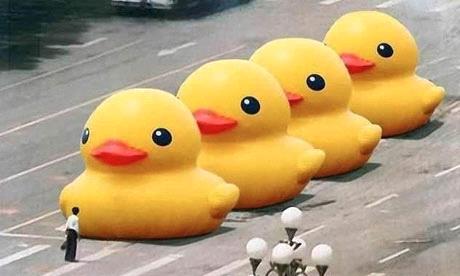Ammon News - It takes a very significant date for the word "today" to be deemed too sensitive to mention. But 24 years after the Chinese government's bloody crackdown on pro-democracy protesters in Tiananmen Square, "today" is part of a long list of search terms that have been censored on Sina Weibo, the country's most popular microblog.
Other banned words include "tomorrow," "that year," "special day," and many number combinations that could refer to 4 June 1989, such as 6-4, 64, 63+1, 65-1, and 35 (shorthand for May 35th).
Chinese Communist party authorities, fearing a threat to their legitimacy, forbid open discussion of the so-called "June 4th incident" in the country's media and on its internet. Yet internet users have reacted by using ever-more oblique references to commemorate the tragedy, treating censors to an elaborate game of cat-and-mouse.
Many of their posts have been embedded in pictures, which can often elude automatic detection: a girl with her hand over her mouth; a Lego man facing down three green Lego tanks; the iconic "tank man" picture with its tanks photoshopped into four giant rubber ducks, a reference to a well-known art installation in Hong Kong's Victoria harbour.
Most of these pictures, too, have since been scrubbed clean. By Tuesday afternoon, the term "big yellow duck" had also been blocked.
Officially, the Chinese government considers the Tiananmen protest a "counter-revolutionary rebellion," and its subsequent crackdown – the declaration of martial law, troops firing indiscriminately at unarmed demonstrators – as necessary for maintaining social stability. Many one-time protesters have since been consigned to the margins of Chinese society. Some have spent long stints in jail; others have fled the country. A large number still face regular harassment by security agents.
On Tuesday, Beijing was both overcast and smoggy, the noon sky as dark as early evening. Volunteer guards with red armbands were stationed every 100 meters on Chang'an Avenue, a broad boulevard which runs past Tiananmen Square in the heart of the city. A group of Hong Kong journalists were briefly detained for filming at an early morning flag-raising ceremony in the historic square and were forced to their footage.
On Saturday, China's foreign ministry spokesman, Hong Lei, censured US calls to provide a full account of the crackdown, calling them "political prejudice". He warned Washington not to make "groundless accusations" and to "stop interfering in China's internal affairs".
Last week, Sina Weibo appeared to have rolled out a new censorship function – searches for "Tiananmen incident" and "six-four incident" were not blocked, but instead pulled up posts about other historical events, such as a 1976 demonstration in Tiananmen Square mourning the death of Premier Zhou Enlai. Yet as of Monday, searches resulted in the regular message: "According to relevant laws, regulations and policies, search results for 'six-four incident' cannot be displayed."
Many prominent intellectuals and celebrities on Sina Weibo have simply taken the day off from posting in an act of quiet protest. One appears to be the prominent film-maker Jia Zhanke. "Don't worry about forgetfulness – at least the Sina censors remember," he wrote on 3 June, according to the blog Tea Leaf Nation. The post has since been deleted.
